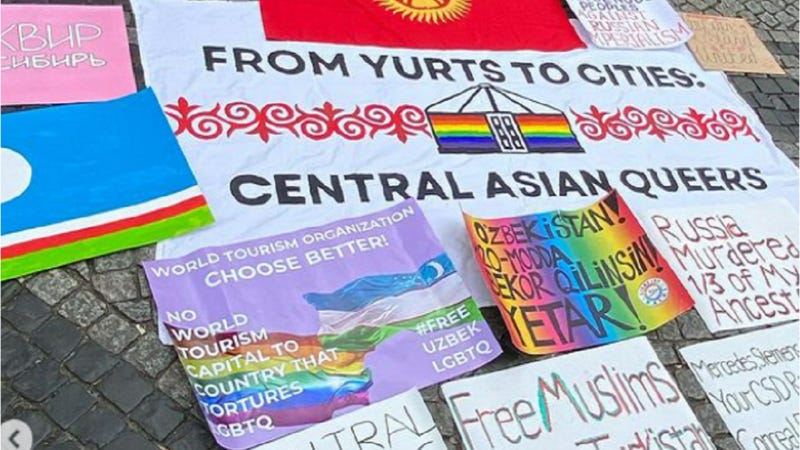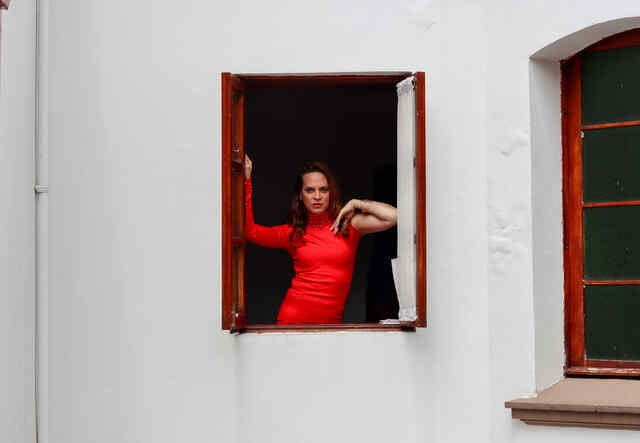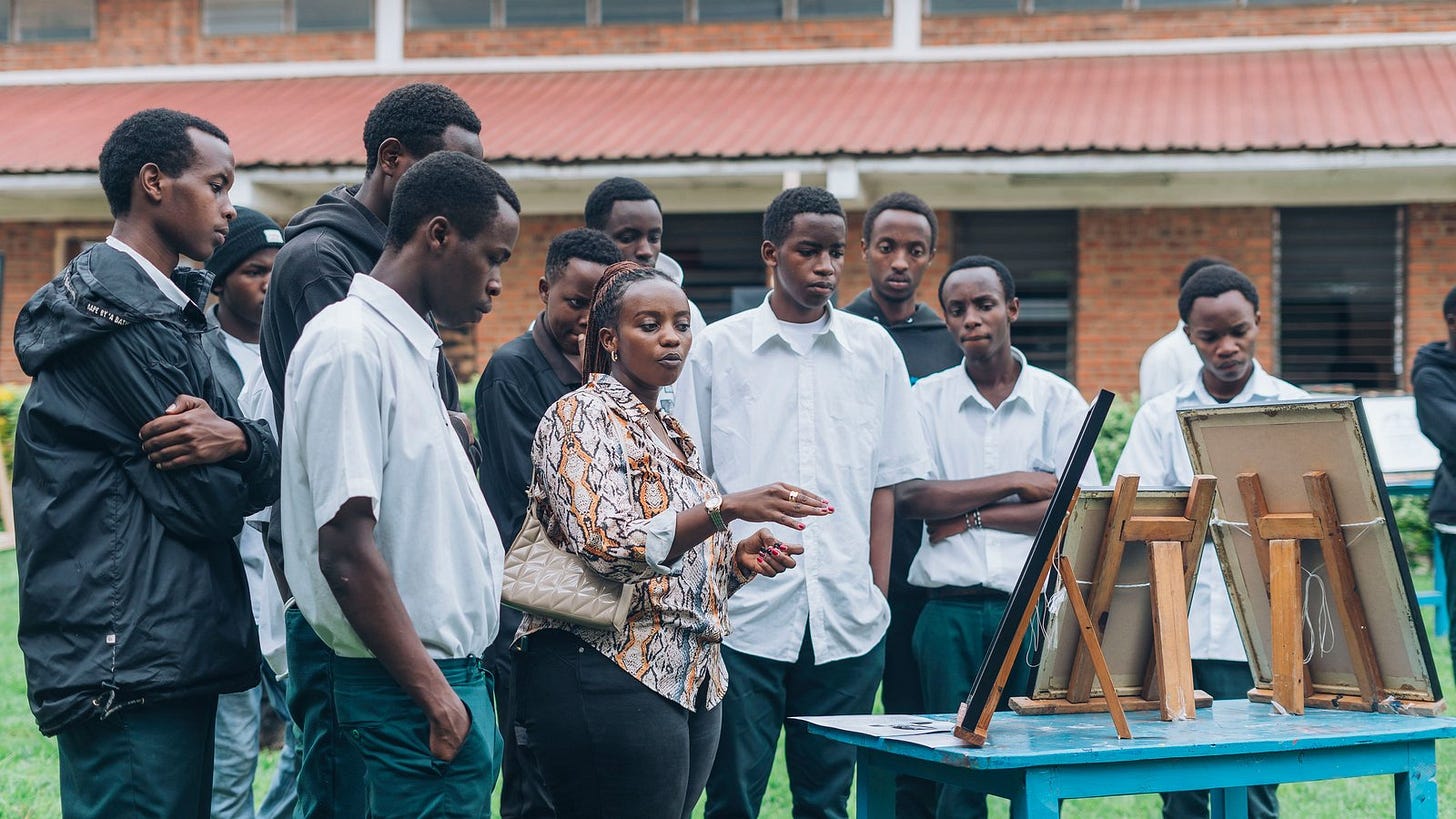Global Roundup: LGBTQ+ Journalists Stand in Solidarity with Gaza, Bulgarian Trans Woman Protests, Queer Tatar Language Activist, Trans Venezuela Activist, Rwanda Woman Artist
Curated by FG Contributor Samiha Hossain
Gary Hershorn, Getty Images
Three LGBTQ+ journalists have resigned from the New York Times Magazine after publicly condemning the outlet's coverage of Israel's bombardment of Gaza, with an additional contributing photographer canceling a major project in solidarity.
Jazmine Hughes, who has been with the Times since 2015, resigned after she was found to have violated the newsroom’s policy on public protest. Hughes is one of over 7,900 writers who signed an open letter by the ad hoc coalition Writers Against the War on Gaza (also known as WAWOG).
The letter says that its signatories “stand in opposition to the silencing of dissent and to racist and revisionist media cycles,” specifically calling out the New York Times editorial board for writing that “what Israel is fighting to defend is a society that values human life and the rule of law.” WAWOG also called on creatives working in cultural institutions to endorse the Palestinian Campaign for the Academic and Cultural Boycott of Israel’s call for a boycott of institutions representing or supporting Israel.
In an email to staffers, New York Times Magazine editor Jake Silverstein wrote that Hughes signing both the WAWOG’s open letter and an open letter from last February condemning the paper’s anti-trans coverage “was a clear violation of the Times’ policy on public protest.” Hughes wasn’t the only queer writer who left the Times over the public protest policy. New York Times Magazine contributor Jamie Lauren Keiles, who also signed both of the aforementioned open letters, announced that they would no longer be working for the publication.
I signed the [WAWOG] letter not as an employee of the New York Times, but as a Black person, as a queer person, as a woman. All of those identities, all of the communities they’re [a part] of, have been awarded their rights by agitation. By protest. And I, as a person at the core of all these identities, wanted to amplify that effort. -Jazmine Hughes
Meanwhile, New York Times Magazine poetry editor Anne Boyer resigned on November 16, elaborating on her decision to exit the publication in a Substack post shared that same day.
“The Israel state’s U.S.-backed war against the people of Gaza is not a war for anyone [...] Its only profit is the deadly profit of oil interests and weapon manufacturers… It is an ongoing war against the people of Palestine, people who have resisted through decades of occupation, forced dislocation, deprivation, surveillance, siege, imprisonment, and torture [...] Because our status quo is self-expression, sometimes the most effective mode of protest for artists is to refuse [...] I can’t write about poetry amidst the ‘reasonable’ tones of those who aim to acclimatize us to this unreasonable suffering. - Anne Boyer
Photographer Nan Goldin also took to her Instagram stories to announce that she had canceled a project in collaboration with the New York Times Magazine “because of the NYT’s reporting on the war on Gaza, which shows complicity with Israel. For what they report and don’t report, and how they question the veracity of anything Palestinians say.”
Gabriela Bankova announced her hunger strike on the steps of a Sofia courthouse earlier this week.
Last week, a trans woman in Bulgaria announced she will be on hunger strike and will not stop until her gender is recognized. Thirty-two-year-old Gabriela Bankova says that, with no "weapons" left to fight for trans rights in Bulgaria, she is ready to sacrifice everything.
After ripping up the birth certificate at the center of the legal dispute over her gender identity, on November 13 Bankova announced an open-ended hunger strike and sit-in on the courthouse steps until her Balkan nation adopts a legal route for cases like hers. Then, on November 16, Bulgarian police handcuffed and detained Bankova on the spot, reportedly for failing to show proper ID. She was subsequently released and reportedly went back to her hunger strike.
Trans people in Bulgaria are a minority and we don't have any weapons to fight for our rights. All the state is offering us are these apparently ineffective cases that drag on for years. -Gabriela Bankova
Arguably the country's biggest case on gender affirmation concluded in February when the top appellate court, the Supreme Court of Cassation, ruled that Bulgarian legislation "does not envisage" legal changes to assigned gender. It cited a Constitutional Court decision from 2021 asserting a "binary existence of the human species" and saying that gender is strictly biological and is "determined at birth and is lost at death."
The LGBT community celebrated in July when lawmakers amended the Bulgarian Criminal Code to include sexual orientation on the list of punishable hate crimes. Bulgaria's wider treatment of sexual minorities has drawn fire from rights campaigners. Critics complain of an absence of legal safeguards for trans and other minorities along with public condemnation and even occasional physical attacks, including by a former right-wing presidential candidate.
For years, institutions in Bulgaria have been mocking us, encouraging violence against us, discriminating against us, and alienating us from society. This works against the rights of trans people to self-identify and have control over themselves. -Gabriela Bankova
LGBT rights and advocacy group, the Bilitis Foundation, and the Gays and Lesbians Accepted In Society (GLAS) Foundation said in their joint post that injustice against self-determination for trans and intersex people in Bulgaria "not only creates discomfort but costs lives and robs from the future of all of us as a society."
Screenshot from Marsel Ganeyev's Instagram account.
Global Voices spoke with Tatar language activist Marsel Ganeyev from Kazakhstan, who also identifies as queer. Marsel is a Ph.D. student in Medical Science currently living in Europe. His aim is to “help minorities reconnect to their roots and overcome the emotional trauma.” Because Marsel is representative of both an ethnic minority in Kazakhstan and neighboring Russia, as well as a sexual minority, his views combine both experiences. Marsel was born in Kazakhstan but identifies as Tatar, an ethnic minority in Kazakhstan and the neighbouring Russian Federation.
Marsel discusses how he has mostly been doing social media activism, has initiated a Kazakh queer documentary project “Qara Magan,” started a podcast on Tatar Identity, and in general motivated hundreds of people to start learning Tatar or their ethnic languages. He is also running a Telegram group, where members are sharing Tatar learning sources, and organizing speaking clubs.
I am trying to define “queer language” within our space. In general, this language is represented by the means that queer Central Asians use to define themselves and communicate to the outside world, for example, specific terminology, language selection, folklore, art, dance etc. -Marsel Ganeyev
According to Marsel, the contemporary queer movement in Kazakhstan faces the challenging task of addressing the country's colonial history. He says a lot of the issues the community is advocating against are the consequences of Soviet anti-gay policies. He mentions how in 2017, Kazakhstan implemented an anti-gay propaganda law, similar to Russia, but it was withdrawn later that year due to complaints from local activists to the European Human Rights Commission. Also, this year Kyrgyzstan introduced a similar policy.
Marsel concludes by talking about his podcast “Tatar identity.” He says the audience is very diverse and mostly Central Asians, non-Russian people of Russia, Russian speakers who find the topics of imperialism important, and the general queer public.
Photo: Julian Ruiz for the IRC
Candy is a 33-year-old transgender woman from Venezuela, a passionate community leader, and fearless dance teacher who is fostering inclusion in Colombia. In June of 2019, Candy faced a tough decision. She had to leave her home in Venezuela. Her journey was long and arduous. It took her a day to reach the border town of Cúcuta, and then another day to travel across Colombia.
It’s not easy when you get to a country and you don’t know anything about it at all. You don’t know how to use public transportation; you don’t know how to get to a certain place. People can sometimes be rude because of xenophobia. -Candy
Eventually, Candy found a job at a local restaurant in her new town in Bogota. There, she worked alongside a fellow trans woman who introduced her to an organization that provides support to LGBTQ+ people. Red Somos is an IRC ally organization that works for the recognition of sexual and gender diversity and community strengthening. Candy found the center to be a place where she could meet new people, receive valuable advice and information, and feel like she belonged to a community. Keen to help support others and share the information she’d learned, Candy now proudly works as a community leader for the organization.
I’ve always liked to talk, being a communicative and participative person, but I didn’t know what to do. Red Somos gave me the tools and knowledge to reach people who are migrants, trans, gay or lesbian who, just like me, as part of the LGBTQ+ community, have specific needs and fears. -Candy
A key focus of Red Somos is supporting victims of gender-based violence, which Candy has been instrumental in managing since the program's inception in December 2022. Among her activities, Candy also leads a dance workshop called “Danza Cabaret”— a safe space for building new dance skills and confidence. Looking to the future, Candy dreams of a world that is inclusive everywhere.
A photograph from “Walk With Me,” a group exhibition focusing on mental health in Jan. 2023 in Rwanda. | Photo courtesy Kakizi Jemima
Kakizi Jemima Akimanizanye is a leading voice for Rwandan women artists. Akimanizanye is an accomplished artist and curator with a multidisciplinary background – she is renowned for her innovative approach to tackling social issues through art.
Akimanizanye’s creative work focuses on exploring taboo subjects and social issues within her community such as women’s empowerment, teenage pregnancy, gender-based violence, environmental protection, and mental health, according to Creative Action Institute, a non-profit organization that catalyzes community-driven solutions that advance gender equality and climate justice globally. Her artwork consists of abstract portrait oil paintings with women at the center of her work.
Akimanizanye noticed a lack of visibility for women in the arts scene compared to men and as a result, she co-founded Rwanda Womxn Artists Collective in 2020 to raise awareness and provide support for women artists. Additionally, Akimanizanye founded the Impundu Arts Center in 2022 with the goal of further promoting women artists in Rwanda.
Samiha Hossain (she/her) is an aspiring urban planner studying at Toronto Metropolitan University. Throughout the years, she has worked in nonprofits with survivors of sexual violence and youth. Samiha firmly believes in the power of connecting with people and listening to their stories to create solidarity and heal as a community. She loves learning about the diverse forms of feminist resistance around the world.






